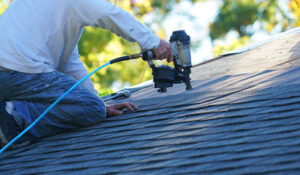Roofers In South Jersey work on residential homes, construction sites, and industrial facilities. They collaborate with other construction professionals and adhere to strict safety protocols.

Local roofers are more likely to provide a full range of roofing services and have the flexibility to accommodate your schedule. They also tend to have high customer satisfaction ratings.
When choosing a roofer, it’s crucial to check their credentials, including licenses and insurance. Licensed roofers are more likely to offer warranty policies, equipment floater coverage and other important insurances like workers’ compensation and liability. Liability insurance helps protect clients from paying out-of-pocket for repairs or replacements that are made as a result of mistakes by the roofer.
Many states require that roofing contractors have liability insurance, which covers the cost of injuries or property damage caused by a roofer while working on a client’s home. A roofer may also have tools floater insurance, which is designed to cover the cost of replacing or repairing tools that are stolen or damaged during work. Besides a basic hammer and nail gun, roofers use a wide range of tools such as prybars that help in removing or attaching shingles, as well as caulking guns that dispense uniform lines of caulking. Several safety-related tools are also used, including ladder tools that hook onto the side of a ladder to hold tools or act as a stabilizing stool on steeper slants.
In addition to a manufacturer warranty, which typically covers material defects for up to 30 years for shingles, roofers can offer homeowners a contractor workmanship warranty to protect against installation mistakes for a set period of time. However, it’s important to note that most of these warranties have extensive fine print that excludes things like water leaks, mold and mildew growth and deteriorating insulation.
Roofing contractors can also offer extended manufacturer warranties, which provide more comprehensive protection than the standard warranty for an additional fee. This type of warranty covers everything from shingles to underlayment and barriers against ice and water, although it’s important to keep in mind that these warranties still have strict fine print. Nevertheless, it can be an excellent investment for customers who want extra peace of mind in the long run.
Local Knowledge
Local knowledge is an intrinsic body of information that has evolved from the local environment to shape cultural practices. It guides traditions, rituals, and problem-solving. It promotes sustainability and a sense of identity among communities. This is in stark contrast to scientific knowledge, which is standardized and abstract. Local knowledge has the potential to create innovative solutions for problems that are unique to a particular place.
The concept of local knowledge encompasses many different forms, from the simple knowledge held by the iceberg hunter to the complex anthropology of traditional indigenous cultures. However, a common thread is the importance of this information in the lives of local peoples. It is crucial for understanding their interactions with the environment and for ensuring community resilience.
Traditional and indigenous cultures have a deep understanding of their ecosystems, with a holistic perspective that encompasses both ecological and cultural processes. This is often reflected in traditional farming techniques, fishing methods, and ceremonial practices. These methods are based on the interplay between humans and their environments and often exceed modern scientific methods.
These traditional ecological practices are a critical part of cultural heritage and identity, providing a strong foundation for communities to adapt to changing environmental conditions. For example, traditional herders use local knowledge to alter grazing patterns and redirect grazing to desired pastures, resulting in conservation benefits. The martial art of capoeira, developed by enslaved Africans, also illustrates how local knowledge can be used to preserve cultural heritage and resist oppression.
However, the integration of this knowledge into modern society is often challenging. While incorporating Indigenous and local knowledge into development and disaster risk management can benefit both parties, the process of capturing this knowledge requires careful consideration. The first step is to recognize that local knowledge is constantly evolving and not static, which can be difficult for outsiders to understand. This also means avoiding assumptions that traditional knowledge is archaic and obsolete.
Personalized Consulting Services
A professional roofer can help property owners with their roofing needs by providing expert advice and educating them about the condition of their roofs. Some consultants even offer repair and installation services, though this is not their primary focus. They act as a guide and advocate for their clients, helping them make informed decisions that are in line with their budgets and priorities.
Specialized roofing CRM software streamlines project details and helps roofers build stronger customer connections. These tools also enable them to keep track of leads, optimize door-to-door sales, and maximize their profits in the competitive roofing industry. Spotio, for instance, offers robust field sales enablement features such as lead tracking and route planning that improve productivity and efficiency. This allows roofing contractors to expand their clientele and boost revenue.
Access to Better Materials
Roofers are often able to get better materials than average homeowners, since they have established relationships with shingle manufacturers and supply houses. This can allow them to provide better warranties for their work, as well as offer customers more options when it comes to materials and costs.
While many people use high-tech laser tools for measuring, a good quality metal measuring tape is still essential for any roofer’s toolbox. This is especially true for larger projects where the shingles will need to be measured in several places.
Depending on the climate where they work, some Roofers may need to take time off in the winter for training purposes. However, they are also likely to be kept on during this offseason as a way to ensure they have the right skills for when work resumes in the onseason. This additional training is not only useful for the workers themselves, but it helps protect consumers from unscrupulous contractors who may attempt to cut corners on job site safety.